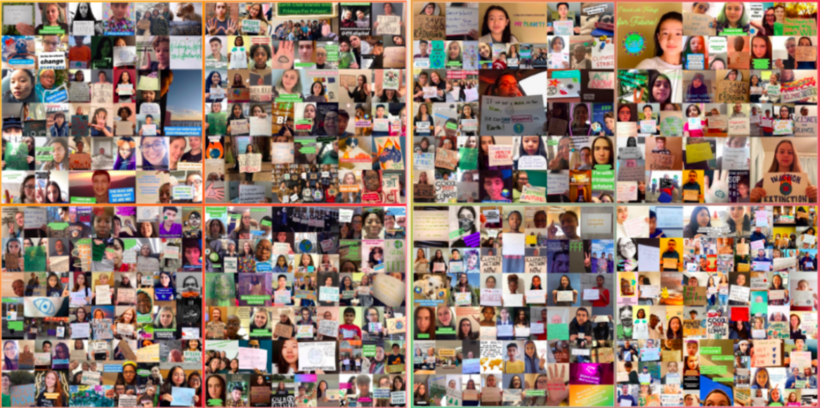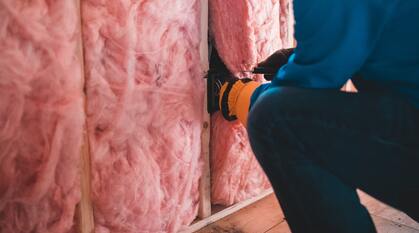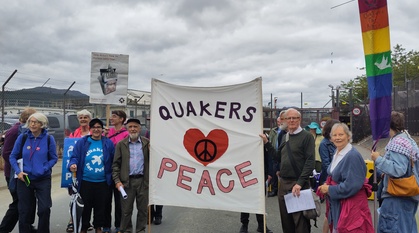A Quaker climate striker talks campaigning through lockdown
Self-care and Zoom calls: 18-year-old Quaker Anya Nanning Ramamurthy speaks to Lyndsay Burtonshaw about the practicalities of continuing climate strikes online.

"Although we're unable to meet on the streets, our campaigning for climate justice must not and has not stopped," says Anya Nanning Ramamurthy, an 18-year-old Quaker who worships at Tottenham Meeting.
"The international youth climate strike community have been holding weekly digital strikes – posting images and messages online, holding webinars, and online calls."
Virtual workshops
When the direct actions move online, so to does the support that we offer to Quaker activists. In the case of climate strikers, Quaker Peace & Social Witness's nonviolent social action training programme, Turning The Tide, and the Economics & Sustainability team have facilitated skillshares through online workshops and phone conversations.
Through one of these workshops in early April, Manchester-area climate strikers were able to take a step back to work out their responses to coronavirus. Through visioning and dreaming exercises, they shared their thoughts on climate justice in the time of Covid-19, before discussing how best to coordinate networking and allyship, and learning about communications strategy.
Among other things, strikers spoke about the UK Student Climate Network (UKSCN) Mission, which states the belief that strikers "need to bring everyone with us in decarbonising and changing our economy. Therefore, UKSCN is inherently anti-racist, anti-sexist, and anti-transphobic, as climate justice cannot be reached without social justice."
Further topics included learning from local anti-racist organising in Manchester, and using the Spectrum of Allies network strategy tool, created by the US Quaker activist George Lakey.
Feeling our way
Climate strikers from across the UK Student Climate Network joined the next online workshop, which focused on 'sustaining our resistance'. Hosted by Turning the Tide, this workshop explored community care cultures, and included sessions exploring burnout, mental health, and self care as an essential responsibility of an activist, as well as the importance of reflection in activist movements to break burnout cycles.
In a time when many people's feelings are either compressed for the sake of coping with life under lockdown or fluctuating wildly, these online spaces offer young activists a valuable space to share feelings and learn from common experiences.
"It gave UKSCN youth strikers the opportunity to come together and think about how we can look after ourselves as well as support one another", says Anya, who coordinated the 'sustaining our resistance' workshop. Having space for processing emotions and experiences also creates room to discuss how young activists can improve ways of working to look after themselves.
For Anya, "in such draining work, it is so important that we are given the space to explore these feelings and issues, and also equipped with resources to maintain this work".
All hands on deck
Whatever else is happening as a result of restrictions designed to contain the spread of Covid-19, people of the global south continue to experience the worst effects of climate breakdown, from flooding to droughts.
Extreme pollution, a consequence of extracting fossil fuels, compounds the mortality rate of coronavirus and puts the poorest city-dwellers in Latin America, Africa and Asia at particular risk.
According to Michel Forst, a UN Special Rapporteur, and Michael Taylor, Director of the International Land Coalition Secretariat, "Land and environmental defenders are sitting ducks, while world goes into lockdown".
To help maintain effective localised campaigning in the global north, we'll continue to support young Quakers and climate strikers as much as we can within our 'new normal', even as some colleagues are furloughed.
We encourage Quakers in local meetings and area meetings to be active in support of climate strikers in their push for climate justice. "Friends can support UK climate strikers in a number of ways," says Anya. "Do reach out to your local climate strike groups and see if they need any support or resources."
"Moreover, if you know individual young Quaker climate campaigners, reach out to them," she continues. "This work can become very draining and isolating at times; for some, having someone reach out to you to check how you're doing, listen and/or provide support can make so much difference.
"As Quakers both individually and as a group, we must engage with the climate justice movement. This can happen in many different ways, including through joining groups fighting for climate justice, offering resources and support to groups and individuals, having discussions on topics surrounding climate justice, and much more.
"Everyone, no matter your knowledge, experience, resources or time, can get involved in the fight for climate justice. This fight is at the centre of Quaker beliefs; we all need to act now."
If you are a Quaker keen to lend your support to the climate strikers, please get in touch – I can be reached at lyndsayb@quaker.org.uk. I look forward to hearing from you!
Films, podcasts, articles, books & more: check out our climate justice resource directory (PDF)


